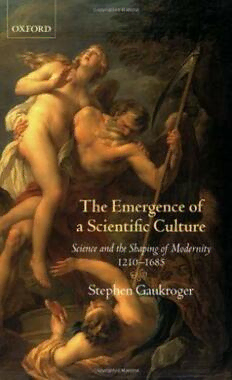
The Emergence of a Scientific Culture: Science and the Shaping of Modernity 1210-1685 PDF
Preview The Emergence of a Scientific Culture: Science and the Shaping of Modernity 1210-1685
THE EMERGENCE OF A SCIENTIFIC CULTURE This page intentionally left blank The Emergence of a Scientific Culture Science and the Shaping of Modernity, 1210–1685 STEPHEN GAUKROGER CLARENDONPRESS·OXFORD 1 GreatClarendonStreet,Oxfordox26dp OxfordUniversityPressisadepartmentoftheUniversityofOxford. ItfurtherstheUniversity’sobjectiveofexcellenceinresearch,scholarship, andeducationbypublishingworldwidein Oxford NewYork Auckland CapeTown DaresSalaam HongKong Karachi KualaLumpur Madrid Melbourne MexicoCity Nairobi NewDelhi Shanghai Taipei Toronto Withofficesin Argentina Austria Brazil Chile CzechRepublic France Greece Guatemala Hungary Italy Japan Poland Portugal Singapore SouthKorea Switzerland Thailand Turkey Ukraine Vietnam OxfordisaregisteredtrademarkofOxfordUniversityPress intheUKandincertainothercountries PublishedintheUnitedStates byOxfordUniversityPressInc.,NewYork ©StephenGaukroger2006 Themoralrightsoftheauthorshavebeenasserted DatabaserightOxfordUniversityPress(maker) Firstpublished2006 Allrightsreserved.Nopartofthispublicationmaybereproduced, storedinaretrievalsystem,ortransmitted,inanyformorbyanymeans, withoutthepriorpermissioninwritingofOxfordUniversityPress, orasexpresslypermittedbylaw,orundertermsagreedwiththeappropriate reprographicsrightsorganization.Enquiriesconcerningreproduction outsidethescopeoftheaboveshouldbesenttotheRightsDepartment, OxfordUniversityPress,attheaddressabove Youmustnotcirculatethisbookinanyotherbindingorcover andyoumustimposethissameconditiononanyacquirer BritishLibraryCataloguinginPublicationData Dataavailable LibraryofCongressCataloginginPublicationData Dataavailable TypesetbyLaserwordsPrivateLimited,Chennai,India PrintedinGreatBritain onacid-freepaperby BiddlesLtd.,King’sLynn,Norfolk ISBN0–19–929644–8 978–0–19–929644–6 1 3 5 7 9 10 8 6 4 2 Preface SincethepublicationofDarwin’sTheOriginofSpeciesin1859,therehasbeenmuch discussionofthevalueandstandingofscience,butcomparativelylittleattentionhas beenpaidtohowscientificvaluesemergedintheWest,withtheresultthattheyhave often taken on the quality of timeless sui generis standards. Yet one striking thing aboutthewayinwhichscienceintheWesthasdevelopedfromtheseventeenthcen- tury onwards is just how distinctive its growth is, compared to that of any earlier orcontemporaryscientificcultures.Inparticular,issuesoflegitimationarisethatare absent from other scientific cultures, and these shape the enterprise in distinct and novelways.Aboveall,theymakepossibletheidealofmodellingallcognitivevalues onscientificones,whichisoneofthemostdistinctivefeaturesofmodernWestern culture.Theearlystagesofthisdevelopmentarethetopicofthisbook. IhavebeenthinkingabouttheseissuessincefirstencounteringtheworkofHans Blumenbergintheearly1980s,althoughitwasnotuntil1995thatIbeganserious workonthepresentproject,ofwhichthisvolumeisthefirstofaprojectedfive.In theearliestincarnationoftheundertaking,oneofmymainaimswastocomparethe developmentofascientificcultureintheWestwithsuccessfulscientificprogrammes thathadquitedifferentculturaleffects,namelythoseofChinaandmedievalIslam, aswellaswithscienceintheIberianpeninsula,wherethesamescientificprogramme thatwastakingrootinNorthernEuropewasdevelopedwithquitedifferentcultural consequences.Thedirectionthattheprojecthastakensubsequentlyhasmeantthat thesecomparativequestionshaveslippedintothebackground,butaskingthemhas certainly helped guide my thinking. Comparison with China made me realize that thesuccessofscienceintheWestintheearly-moderneramightbeduetoitsclose association with religion, rather than any attempt to dissociate itself from religion; comparisonwithIberiansciencehelpedmerealizejusthowcontingentandprecari- ous any association between scientific values and modern culture was in the early- modernera;andcomparisonwithmedievalArabicsciencemademerealizejusthow peculiarandanomalousthedevelopmentofscienceintheWestwas,andinparticular howdistinctiveitslegitimatoryprogrammewas. Thetitlepageannounces1210and1685astheterminiofthisbook,andthechoice perhaps needs explanation. The former is the date of the first Paris condemnation of Aristotle, the reintroduction of whose works into the West precipitated a trans- formationofWesternintellectualculture,makingnaturalphilosophythekeytoan understandingoftheworldandourplaceinit.Ihaveoccasionallygonefurtherback, sometimes in detail, to classical, Hellenistic, and Patristic cultures, but only where thisisneededinordertounderstandlaterdevelopments.Thedate1685,bycontrast, is not marked by an event and is a little rubbery, in that there are some formative developmentswhoseorigins predate 1685 that I have deferredto the next volume. Nevertheless,between1686and1691seminalworksbyNewton,Varignon,Locke, vi Preface Leibniz, Ray, Fontenelle and others appear that ushered in a new era of thinking aboutnatural-philosophicalquestionsandtheirsignificance,and1685roughlymarks anaturaldivide. In the course of writing, I have inevitably built up many intellectual debts. For ideas,advice,thoughts,andconstructivecriticisms,Iwouldparticularlyliketothank: Peter Anstey, Constance Blackwell, Des Clarke, Floris Cohen, Conal Condren, JohnCottingham,Beatriz Domingues,OferGal, DanGarber,PeterHarrison,Ian Hunter, Rob Iliffe, Helen Irving, Susan James, Jamie Kassler, Ian Maclean, Noel Malcolm, Victor Navarro Broto´ns, Simon Schaffer, Wilhelm Schmidt-Biggemann, Ulrich Schneider, Richard Serjeantson, Steven Shapin, Nathan Sivin, John Ward, Catherine Wilson, Rachel Yuen-Collingridge, and above all John Schuster, with whom I have discussed questions of natural philosophy to my great benefit over a periodofthirtyyears. Itgoeswithoutsayingthataprojectofthisscalerequiresconsiderablemomentum and I would have been greatly hindered in undertaking it without very generous supportfromtheAustralianResearchCouncilovermanyyears,whichhasprovided mewithnear-idealconditions.Workonthebookhasbeenpursuedprimarilyatthe University of Sydney, but generous hospitality has been provided by the School of AdvancedStudyattheUniversityoftheLondonduringthefirsthalfof2005,where IwasabletotakeadvantageofthewonderfullibraryoftheWarburgInstitute. Materialfromthebookhasbeenpresented,overaten-yearperiod,atinvitedtalks, conferencepresentations,andpubliclecturesattheUniversityofCaliforniaatDavis, Cambridge University, University of Chicago, Columbia University, University of Copenhagen,UniversityCollegeCork,UniversityofEdinburgh,UniversityofHel- sinki,UniversityofHongKong,Bogazic¸i UniversityIstanbul,UniversityofLeeds, ImperialCollegeLondon,theSchoolofAdvanced Studyat theUniversityofLon- don, All Souls’ College Oxford, Princeton University, University of Queensland, Federal University of Rio de Janeiro, the Russian Academy of Sciences (Moscow), UniversityofSydney,UniversityofUppsala,UniversityofUtrecht,andtheWarburg Institute. I have drawn on earlier writings in some sections of the book. In particular, an abridgedversionofCh.1waspublishedinCriticalQuarterly(2005);earlyversionsof partsofCh.6haveappearedas‘TheAutonomyofNaturalPhilosophy:FromTruth toImpartiality’,inPeterAnsteyandJohnSchuster(eds.),TheScienceofNatureinthe SeventeenthCentury(Dordrecht:Kluwer,2005);andearlyversionsofpartsofCh.6 and7as‘ThePersonaoftheNaturalPhilosopher’,inConalCondren,StephenGauk- roger,andIan Hunter(eds.),The Philosopher inEarlyModernEurope (Cambridge: CambridgeUniversityPress,2006). Contents Introduction 1 PART I 1. ScienceandModernity 11 TheEnlightenmentInterpretation 17 ScientificAutonomy 22 MethodandLegitimation 31 PART II 2. AugustinianSynthesistoAristotelianAmalgam 47 TheAugustinianSynthesis 49 TheTransitiontoaScholasticCulture 59 TheCondemnationsofAristotle 70 TheAristotelianAmalgam 77 CompetingConceptionsofMetaphysics 80 3. RenaissanceNaturalPhilosophies 87 PlatonismasanAlternativetoScholasticism 88 NaturalismandtheScopeofNaturalPhilosophy 101 LateScholasticism 116 4. TheInterpretationofNatureandtheOriginsofPhysico-Theology 129 FirstCauses 130 InterpretationofNature 133 Hermeneutics 139 DivineTranscendentalismversusPhysico-Theology 149 PART III 5. ReconstructingNaturalPhilosophy 157 TheProblemofDiscovery 160 SpeculativeversusProductiveDisciplines 164 HypothesesandthePhysicalStandingofAstronomy 169 6. ReconstructingtheNaturalPhilosopher 196 SpeculativeversusProductivePhilosophers 196 viii Contents Officiisphilosophiae 207 TheNaturalPhilosopherversustheEnthusiast 220 7. TheAimsofEnquiry 228 Plato’sCaveversustheElenchos 229 TruthandObjectivity 239 TheGoalsofNaturalPhilosophy 245 PART IV 8. CorpuscularianismandtheRiseofMechanism 253 CorpuscularianismandAtomism 257 GassendiandtheLegitimacyofAtomism 262 Beeckmanand‘Physico-Mathematics’ 276 CorpuscularianismandMechanism:Hobbes 282 Descartes’PrincipiaPhilosophiae 289 CartesianCosmology 304 TheFormationoftheEarth 317 9. TheScopeofMechanism 323 PrimaryandSecondaryQualities 323 Biomechanics 337 NaturalPhilosophyandMedicine 346 10. ExperimentalNaturalPhilosophy 352 NaturalHistoryandMatterTheory 356 TheFocusingofNatural-HistoricalEnquiry:GilbertversusBacon 359 TheAirPump:HobbesversusBoyle 368 TheProductionofColour:NewtonversusDescartes 379 AccommodatingtheExplananstotheExplanandum 397 11. TheQuantitativeTransformationofNaturalPhilosophy 400 HydrostaticsversusKinematics 403 TheQuantificationofMotion 413 MechanicsasKinematics 420 CosmicDisorder 430 Dynamics 440 PART V 12. TheUnityofKnowledge 455 CommonCausation 457 Contents ix Politico-TheologyandNaturalPhilosophy 471 Physico-TheologyandNaturalPhilosophy 492 Conclusion 506 BibliographyofWorksCited 510 Index 551
